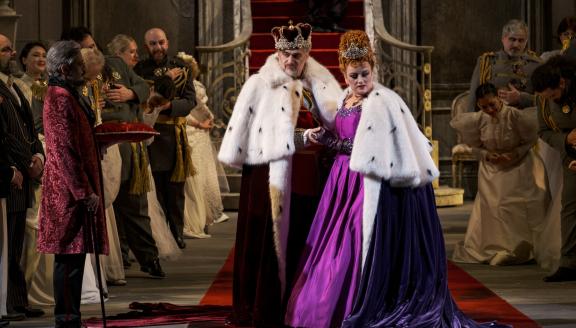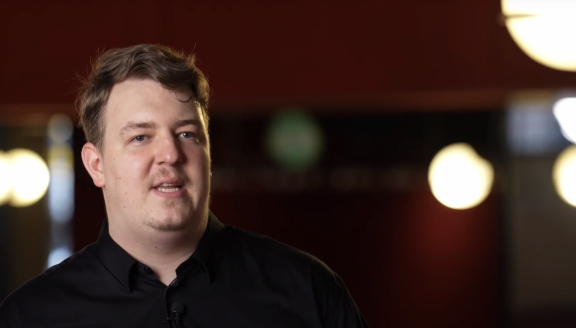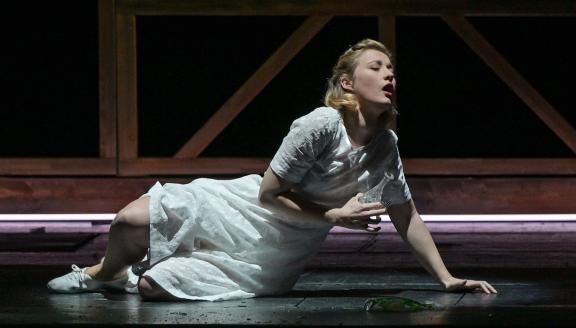Hamlet, Prince of Denmark, discovers that his father, the King, was killed by his uncle, in a plan to marry the Queen and usurp the throne. To expose the murderer, the young Prince is compelled to sacrifice all, including the love of the faithful Ophelia.
With its lively dances, ghost scenes and touching arias, Hamlet was Ambroise Thomas’s single great success of the Paris Opera, remaining in its repertoire for decades after the 1868 premiere. On the opening night, the title role was sung by a baritone, as has become the custom ever since. With the rediscovery of the original score in recent years, it transpires that Thomas originally scored the role of Hamlet for a tenor. In this new production of Teatro Regio Torino, the tenor John Osborn is the tormented prince, singing the celebrated monologue “To be or not to be” (“Être ou ne pas être”). Sara Blanch sings Ophélie, whose pyrotechnic aria in the mad scene is a pièce de résistance for a coloratura soprano. Under the musical direction of Jérémie Rhorer, the production is directed by Jacopo Spirei.
CAST
|
Hamlet, Prince of Denmark
|
John Osborn
|
|---|---|
|
Ophélie, daughter of Polonius
|
Sara Blanch
|
|
Gertrude, Queen of Denmark and mother of Hamlet
|
Clémentine Margaine
|
|
Claudius, King of Denmark
|
Riccardo Zanellato
|
|
Laërte, son of Polonius
|
Julien Henric
|
|
Ghost of the late King, Hamlet’s father
|
Alastair Miles
|
|
Marcellus officer, friend of Hamlet
|
Alexander Marev
|
|
Horatio officer, friend of Hamlet
|
Tomislav Lavoie
|
|
Polonius, Lord Chamberlain of the Royal Household
|
Nicolò Donini
|
|
First Gravedigger
|
Janusz Nosek
|
|
Second Gravedigger
|
Maciej Kwaśnikowski
|
|
Orchestra
|
Orchestra Teatro Regio Torino
|
|
Chorus
|
Chorus Teatro Regio Torino
|
| ... | |
|
Music
|
Ambroise Thomas
|
|---|---|
|
Text
|
Jules Barbier, Michel Carré
|
|
Director
|
Jacopo Spirei
|
|
Conductor
|
Jérémie Rhorer
|
|
Sets
|
Gary McCann
|
|
Costumes
|
Giada Masi
|
|
Choreography
|
Ron Howell
|
|
Lighting
|
Fiammetta Baldiserri
|
|
Chorus master
|
Ulisse Trabacchin
|
| ... | |
VIDEOS
STORY
Act I
Scene 1 – Elsinore
As the court celebrates the wedding of Gertrude—widow of King Gonzague—and his brother and successor Claudius, Prince Hamlet, son of Gertrude and the late king, reflects bitterly on how hastily his mother has remarried. He is joined by Ophélie, who is distressed by rumors that he intends to leave court and fears that he is losing interest in her. With a sudden outpouring of affection, Hamlet reassures her: everything may be doubted, but not his love for her. Laërte then appears: sent on a diplomatic mission to Norway, he bids the prince farewell and entrusts his sister Ophélie to Hamlet’s protection. A fanfare announces the start of the wedding banquet. Ophélie and Laërte urge Hamlet to join them, but he refuses to take part in the festivities. As the revelers celebrate, Marcellus and Horatio arrive looking for Hamlet: they want to tell him of a ghostly apparition they saw the night before. Laughed at by the other guests, they leave in search of the prince.
Scene 2 – The battlements
Horatio and Marcellus recount their supernatural vision to Hamlet. At midnight, the ghost of the king appears once more: Hamlet addresses him fervently, but the ghost signals that he will not speak in the presence of the others. Reluctantly, Horatio and Marcellus withdraw. Alone with his son, the ghost reveals that he was murdered by Claudius and demands revenge: Hamlet must kill the usurper. As for Gertrude, who is also guilty, her punishment must be left to divine justice. The prince solemnly vows to carry out his father's will.
Act II
Scene 1 – The palace gardens
Ophélie, saddened by Hamlet’s increasingly cold and distant behavior, tries to distract herself with reading. Hamlet appears but does not speak to her and quickly leaves. Ophélie reflects sorrowfully on how quickly love’s promises fade. She confides her distress to the queen and asks to leave court. Gertrude, concerned about her son’s state of mind, urges her to stay, convinced that her presence will help Hamlet recover. Seeing the king approach, the queen dismisses her. Claudius believes Hamlet’s behavior is due to mental instability and is reassured that the prince suspects nothing. In the following conversation, however, Hamlet is distant with Claudius and responds enigmatically to his mother when she mentions Ophélie. He then announces he has summoned a troupe of travelling actors to entertain the court. Marcellus introduces them, and the comedians offer an ironically deferential greeting. Hamlet—convinced that Claudius will betray himself if he sees his crime reenacted—instructs them to perform The Murder of Gonzago. He himself will signal the moment when the poison is poured. He then calls for a toast and sings a drinking song, inviting all to drown their sorrows in wine.
Scene 2 – A grand hall of the palace, decorated for a celebration
The king and queen enter, followed by the courtiers. Hamlet sits at Ophélie’s feet—she is frightened by his gaze—and instructs Marcellus to closely observe the king’s reactions. The actors perform the pantomime as planned, and Claudius, visibly shaken, betrays his guilt: distraught, he orders the actors out, while Hamlet, in a frenzy, denounces him as his father’s murderer and seizes his crown. The courtiers are shocked and bewildered by Hamlet’s behavior. As Horatio and Marcellus try to restrain their friend, who resumes his mad act by singing the drinking song again, the king and queen hurriedly exit.
Act III
A room in the queen’s apartments
Hamlet wonders why he has not yet killed Claudius, reflecting on his responsibilities and the fate of man after death. Seeing the king approach, he hides. Claudius, tormented by guilt, prays to his brother to intercede with God on his behalf. Hamlet could strike him easily, but refrains: if Claudius dies while praying, his soul might be saved. In the following conversation between Claudius and Polonius—who urges the king to keep calm and not expose himself or his accomplices—Hamlet learns with horror that Ophélie’s father was complicit in the regicide.
Gertrude and Ophélie enter. The queen begs Hamlet to marry the girl, but he coldly refuses. Ophélie leaves in tears. Alone with his mother, Hamlet reveals he knows the truth. Gertrude throws herself at his feet, begging him to spare her life. The ghost then reappears, urging the prince once more to kill Claudius but to spare his mother.
Act IV
A wooded landscape by a lake
A group of peasants welcome the spring by dancing on the lakeshore. Ophélie asks to join the festivities, handing out flowers from her garland. She then sings a sorrowful ballad and, overcome by madness, ends her life by gently letting herself sink into the waters.
Act V
The cemetery at Elsinore
Two gravediggers sing a cynical drinking song: love, wealth, glory—all is vanity, except the pleasures of wine. When Hamlet asks whose grave they are digging, they cannot answer. Still unaware of Ophélie’s death, Hamlet regrets having wounded her with his rejection. Laërte, returned from his mission, confronts Hamlet and blames him for his sister’s death. The two young men are about to fight when a funeral procession arrives, led by the king and queen, bearing Ophélie’s coffin. At that moment, the ghost appears for the last time. Hamlet obeys its command, kills Claudius, and seizes the crown, while the courtiers acclaim him as king.
INSIGHTS
Fear and Delirium in Elsinore
Director’s notes by Jacopo Spirei
To be or not to be? The greatest question of our lives. What should we do when a task greater than ourselves falls upon our shoulders? Must we become our parents? Their spirit of revenge?
Hamlet is filled with unanswered questions, overwhelming responsibilities and a traumatic reality that breeds every kind of nightmare. This Hamlet is a journey into ourselves - through introspection, questioning and searching.
Can a man whose only fault is to be the son of a beloved king truly seek revenge? How can he look his mother in the eye on the day of her wedding to his uncle? How do we speak to the ghost of our responsibilities?
This production delves into the deepest corners of the human spirit. Through Hamlet’s endless monologues, we search for a way to understand who we are and what is right or wrong.
Hamlet’s story is one of continual failure, set in a world collapsing in on itself, where values progressively lose their meaning. We wander through the labyrinth of his mind; a gothic, decaying world where nightmares become reality. A maze, from which there is no escape, constantly shifting, never stable.
Hamlet is almost a non-opera, filled with unfinished stories, untold or perhaps unspeakable truths. Perhaps we can only speak clearly when everything has been lost - even reason, like Ophelia. It is a story that exists by denying itself: a tale of unfulfilled revenge, but above all, a story of failure.
Hamlet is, in many ways, the original outsider - the first procrastinator. His is a story of breakdown and defeat, the kind of failure that still terrifies us today, lost as we are in our digital labyrinths, where the voices of haters become powerful ghosts, pushing our psyche toward the ultimate act of self-destruction. Suicide is a constant presence in Hamlet’s mind, as he questions the meaning of life and the point of fighting a battle that cannot be won. He is the mirror of an existential crisis to which we are all, sooner or later, called to respond - in the silence and darkness of our own solitude.
Hamlet lives in a world haunted by monsters and visions interwoven with reality. We never know if what we see and hear is real, imagined or remembered. He moves through a royal palace that keeps changing, yet always remains the same. The only moments of joy are found in intoxication, in the artificial paradises of substance use or in death.
In Act III, Hamlet says to his mother, ‘Into the depths of your soul - dare to look and recognise yourself!’ This is what the story demands of us: it forces us to confront our own solitude and passivity, to search for ourselves in a world that no longer listens; a world that accepts injustice without flinching and quickly bows to the law of power. A world in which our fears take on the monstrous and exaggerated dimensions of our obsessions.
In Hamlet’s inability to face life, we see our own. In his hesitation, in his inaction, we recognize our own limits; those of modern society, always interconnected yet emotionally disconnected. Above all, we see the reality that young people live every day, in their desperate attempt to find meaning in a world in crisis and in constant collapse, while facing an adult world that ignores them, belittles them or tries to replace them.
Ultimately, Hamlet’s fate is not his own. It is imposed by a father too perfect and too demanding, who only emphasizes the son’s weaknesses. Yet Hamlet is handed the duty of revenge, of changing the world, of bringing justice. Hamlet fails, and yet the revenge is fulfilled. Despite his reluctance, the destiny decided by the father falls upon the son.
Through his failure, Hamlet teaches us that the future is already written - unless we choose to act and change it.
GALLERY












